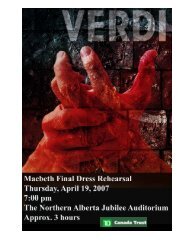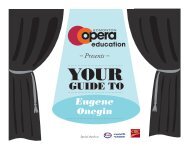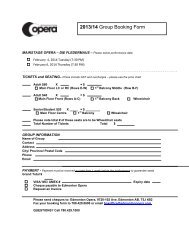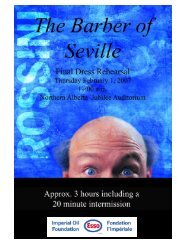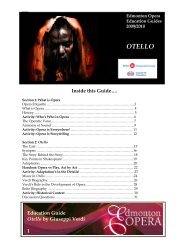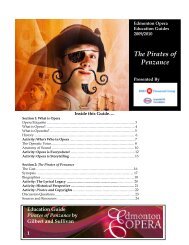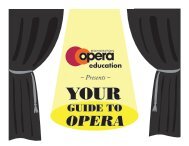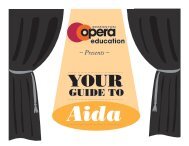Education Guide The Flying Dutchman by ... - Edmonton Opera
Education Guide The Flying Dutchman by ... - Edmonton Opera
Education Guide The Flying Dutchman by ... - Edmonton Opera
Create successful ePaper yourself
Turn your PDF publications into a flip-book with our unique Google optimized e-Paper software.
What is <strong>Opera</strong>?<br />
<strong>The</strong> word opera is the plural form of the Latin word opus (which translates quite<br />
literally as work). Today we use the word opera to refer to a theatrically based musical art form<br />
in which the drama is sung (without microphones!), rather than spoken, and is accompanied <strong>by</strong><br />
a full symphony orchestra.<br />
<strong>Opera</strong> was born out of the belief that drama can be better expressed <strong>by</strong> music and text than <strong>by</strong><br />
text alone. One of the unique things about opera is how it combines so many different art forms<br />
(music, drama, and visual arts) to create an artistic spectacle. Of course, the use of many art<br />
forms means that there are many people involved in the creation and production of an opera.<br />
<strong>The</strong>se may include:<br />
Composer: Writes the music<br />
Librettist: Chooses a story, writes or adapts the words<br />
Conductor: Leads the musicians<br />
Director: Blocks or stages the entire production<br />
Principal Singers: Have the leading and supporting roles<br />
Chorus: Sing as a group<br />
Supernumeraries: Act but do not sing<br />
Repetiteur: Accompanies singers during rehearsal, plays the whole orchestral score on<br />
piano<br />
Costume Designer: Designs the costumes for each character<br />
Wardrobe/Costume Staff: fit, clean and repair costumes; help singers put costumes on<br />
Wig Staff: Make wigs and prepare make-up<br />
Make-up Staff: Apply make-up for principal singers, assist chorus with make-up<br />
Set Designer: Designs the scenery for each scene<br />
Lighting Designer: Designs lighting effects<br />
Prop Builders: Build/buy all the set pieces that are not structural<br />
Stage Manager: “Calls the show” -- cues scenery changes, lighting and actors so that<br />
everything happens at the right time.<br />
Stagehands: Move scenery; run lighting & sound cues<br />
Front of House Staff: Work in the performance venue: seating patrons, operating coat<br />
check<br />
Artistic Director: Chooses which shows to produce and which artists to hire<br />
Administrative Staff: Find funding (!); sell tickets; hire artists; take care of the business<br />
side of opera.<br />
Audience: Enjoys and appreciates opera from a seat in the hall!<br />
Critic: Writes a critique of performance for newspaper, radio, or TV<br />
<strong>Education</strong> <strong>Guide</strong><br />
<strong>The</strong> <strong>Flying</strong> <strong>Dutchman</strong><br />
<strong>by</strong> Richard Wagner<br />
3



